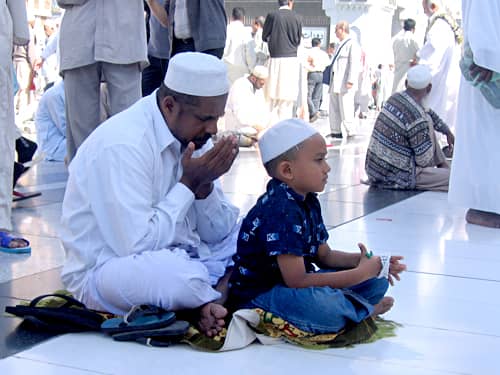RIYADH, Saudi Arabia--Saudi Arabia is the birthplace of Islam and a nation where religion and government are deeply entwined and where faith and identity are virtually identical.
But since the Sept. 11 attacks on the United States, religion in Saudi Arabia--especially the kingdom's rigidly conservative Wahhabism strain of Islam--has come under increasing criticism both inside and outside of the country, with some critics maintaining it contributes to extremism and terrorism.
Others, however, such as cleric Sheik Abded Muhsin al-Ubakyan, reject the criticism, arguing Saudis are simply following the true path of Islam as preached by the 18th century religious reformer Mohammed Abdel Wahhab.
"He came and found people worshipping idols, graves and trees," Ubakyan told the PBS program "Religion & Ethics Newsweekly." "`This is not Islam,' Abdel Wahhab came to say. `This is wrong,' and (he) returned people to the correct understanding of Islam."
Wahhab formed an alliance with local tribal leaders--the al Sauds--around the desert town of Dirayah. Out of that 18th century political and religious union, modern Saudi Arabia was born. The religious followers of Wahhab gave the ruling family religious legitimacy, and in return the clerical establishment was given nearly free rein in determining Saudi social and religious policy.
The result is a very conservative interpretation of the Qur’an with religious police enforcing the country's strict social codes, including rigid gender separation at work as well as in restaurants, banks and other public establishments.
"In modern society, there is corruption that results from the mixing of men and women," Ubakyan said. "From desire comes adultery, illegitimate children, and sexual disease."
Wahhabism also decrees that Islam is the only recognized religion and non-Muslims are banned from public worship or evangelizing. Some Wahhabi clerics preach against tolerating other faiths, as well as Muslim sects that don't share their interpretation of the Qur’an.
"Anyone who is not a Muslim is an infidel, no matter what religion he is," said Suleiman al Duwaish, a cleric and religious scholar.
"We also recognize the difference between which of these infidels deserve to be cursed and those who don't," he added. "God himself differentiated between Jews and Christians. While both being infidels, Christians are closer to Muslims than the Jews and less of an enemy than them as well."
Traditionally, it has been taboo to criticize the religious establishment, and most Saudis have enormous respect for their spiritual leaders. But a series of deadly al-Qaida attacks in the last several years have begun to change both government and popular attitudes.
Some, like religious reformer Khaled al Ghannami, a former Wahhabi, believe that Wahhabism nurtures extremism.
"Those teachings encouraged people to come up with ideas that this country must be pure, that nobody else who is not Muslim should set foot in this land, and that everyone who comes here (who is not Muslim) ... can be killed just for being there," Ghannami said.
The government has launched a campaign to combat terrorist militancy. Posters and billboards urge citizens to report terrorists, and Saudi King Abdullah has accused extremists of hijacking Islam. He has called on clerics to be more moderate in their preaching and initiated a series of national dialogues to discuss extremism, problems facing young people and the role of women--one of the touchier issues facing Islam.
The government has also ordered a revision of the school curriculum, including stripping textbooks of hostile references to other religions. The Ministry of Islamic Affairs is three years into an evaluation of the country's mosques and spiritual leaders, some of whom have been disciplined.
"There is some misunderstanding with some of the imams, and when we interviewed them and talked to them, they changed their ideas," said Abdullalah Allheedan, assistant deputy minister for Islamic Affairs. "We found some of them who are followers of the extremist ideas, and these people were fired."
Allheedan says the extremist militancy is not homegrown but came from the outside, mostly from young people who joined militants for "jihad" in Afghanistan, Bosnia and Chechnya.
While the U.S. government, a reluctant critic of its close ally, says the Saudis have taken steps to fight domestic extremism, many critics in the kingdom believe it should do far more.
"They would have to, for example, reform education, reform the media, reform internal policy and open the floor" for other ideas," said Khaled al Dakhil, a political sociologist at King Saud University in Riyadh. "They don't have to do anything with the Wahhabis but open the floor (up) for other interpretations, other discourses, religious and otherwise. That will give you the leeway, the freedom to move."
But Dakhil said Saudi authorities are reluctant to challenge the clerics' dominance for fear it would undermine their legitimacy as rulers and the stability of the state.
"Maybe they are afraid that if you increase the pace of change, if you really challenge the religious authorities, you will get into a clash with the society, and that might cause disintegration, chaos," he said.
While the government is cautious on making changes, some citizens--especially women--are forging ahead.
Samar al Mogren, for example, is the local news editor of Al Watan newspaper and is the first Saudi woman to oversee a mixed gender news department despite the religious restrictions against mixing men and women in the workplace.
"It's my right as a woman to live my life as humanly as possible in my country and to fulfill my ambitions and my dreams without having to leave," she said.

